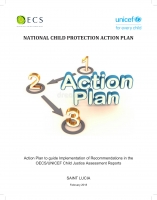
Morne Fortune, Castries, Saint Lucia
Phone: +1 (758) 455-6327
Contact the OECS Commission
External Vacancies
Events
FAQs
OECS Laissez-Passer Certificate
Grievance Redress
Intranet
Subscribe to OECS Newsletter
Google Translate:
Switch Language:
Select your language

National child protection systems, including the administration of juvenile justice, require States to recognise their responsibilities and human rights obligations to children in order to be effective. They must consist inter alia of i) laws and policies that protect children from abuse, neglect, exploitation and violence and that promote the use of community-based, non-punitive and noncustodial measures for the rehabilitation of young offenders as a first resort; ii) laws, policies and programmes that respond in the best interest of the child when violations occur; iii) effective regulation and monitoring at all levels of child protection standards, for instance, in childhood institutions, schools and detention centres iv) a committed workforce with relevant competencies and mandates; and v) mechanisms that bring perpetrators to justice, where violations occur Governments across the Caribbean, including the OECS region, have undoubtedly stepped up their efforts to improve these required State responses to child protection, both for children who are at risk of harm, as well as those who have come into conflict with the law. All Caribbean countries have ratified the CRC and, more recently, several have passed laws, and developed policies and, for protecting children against abuse, neglect and exploitation. Across the region, programmes and initiatives are currently being undertaken at the national level to implement both law and policy and to generally address priority child protection issues. While these efforts are positive and demonstrate a genuine commitment to improving the protection of children, concerns continue to be raised about the actual implementation and delivery of services. Child Protection Action Plans can go a long way in enhancing implementation efforts and set the stage for the very conscious and deliberate strategizing that ought to be encouraged for the effective delivery of child protection services. The current initiative is geared at setting out the priority actions for Grenada in the strengthening of their responses to children who are vulnerable because of maltreatment or their involvement in the justice system.
National child protection systems, including the administration of juvenile justice, require States to recognise their responsibilities and human rights obligations to children in order to be effective. They must consist inter alia of i) laws and policies that protect children from abuse, neglect, exploitation and violence and that promote the use of community-based, non-punitive and noncustodial measures for the rehabilitation of young offenders as a first resort; ii) laws, policies and programmes that respond in the best interest of the child when violations occur; iii) effective regulation and monitoring at all levels of child protection standards, for instance, in childhood institutions, schools and detention centres iv) a committed workforce with relevant competencies and mandates; and v) mechanisms that bring perpetrators to justice, where violations occur Governments across the Caribbean, including the OECS region, have undoubtedly stepped up their efforts to improve these required State responses to child protection, both for children who are at risk of harm, as well as those who have come into conflict with the law. All Caribbean countries have ratified the CRC and, more recently, several have passed laws, and developed policies and, for protecting children against abuse, neglect and exploitation. Across the region, programmes and initiatives are currently being undertaken at the national level to implement both law and policy and to generally address priority child protection issues. While these efforts are positive and demonstrate a genuine commitment to improving the protection of children, concerns continue to be raised about the actual implementation and delivery of services. Child Protection Action Plans can go a long way in enhancing implementation efforts and set the stage for the very conscious and deliberate strategizing that ought to be encouraged for the effective delivery of child protection services. The current initiative is geared at setting out the priority actions for Grenada in the strengthening of their responses to children who are vulnerable because of maltreatment or their involvement in the justice system.